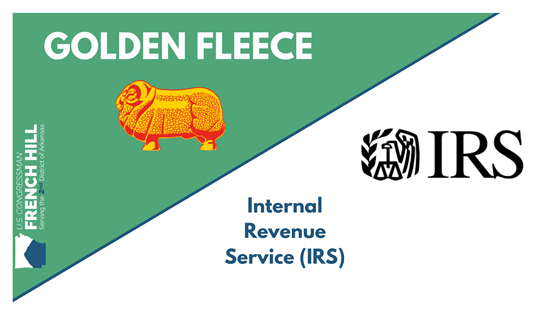RELEASE: REP. HILL AWARDS GOLDEN FLEECE TO INTERNAL REVENUE SERVICE FOR MISMANAGING SENSITIVE TAXPAYER RECORDS
WASHINGTON, D.C.,
January 30, 2024
WASHINGTON, D.C. - Rep. French Hill (AR-02) named the Internal Revenue Service (IRS) as the latest recipient of his Golden Fleece Award for maintaining poor record-keeping processes of sensitive taxpayer information which may have exposed individual taxpayers to potential identity theft fraud.
Rep. Hill said, “The Internal Revenue Service (IRS) has failed to fulfill their Congressionally mandated duty to safely store taxpayer records, including individual tax filer names and their corresponding Social Security Numbers. Additionally, the agency has failed to properly destroy old records and ensure that those they are safeguarding remain functional. This is particularly concerning given that in 2022, with Democrats in control of Washington, Congress gave the IRS nearly $80 billion. For their poor recordkeeping which has compromised the information of potentially millions of taxpayers, I am naming the IRS as the latest recipient of my Golden Fleece Award.”
In a letter to IRS Commissioner Daniel Werfel, Rep. Hill writes:
Dear Commissioner Werfel:
I write today to inform you that the Internal Revenue Service (IRS) is this month’s recipient of my Golden Fleece Award for your agency’s irresponsible management of sensitive taxpayer records. The Office of the Treasury Inspector General for Tax Administration (TIGTA) found that the IRS did not properly safeguard sensitive taxpayer information and comply with record-storage requirements. These record-keeping lapses have resulted in millions of taxpayers having their tax information, including their name and Social Security Number or Employer Identification Number, lost and potentially jeopardized.
For context, the Federal Records Act of 1950 required IRS to backup and store business tax records and individual tax records for 75 and 30 years, respectively. As I understand, to fulfill record-keeping requirements, IRS decided to use microfilm cartridges to store photographic records of tax information as a low-cost, reliable, long-term, and standardized system, with one microfilm cartridge holding up to 2,000 photographic images.
During TIGTA’s investigation, on-site inspections of Tax Processing Centers, which are responsible for safely storing and preserving the microfilm, found that some boxes which were supposed to contain microfilm cartridges were labeled as out for reformat in 2013, yet those microfilms could not be accounted for. Additionally, instead of being stored securely, some microfilm cartridges were found on open shelving, out of the control of IRS personnel, and accessible by all personnel at the facilities. Further, the Tax Processing Centers did not have processes to ensure that microfilm cartridges were stored safely in a manner that will preserve them.
Inspectors also identified that annual inventory checks were not being conducted, some records exceeding their storage time limits were not being timely and properly destroyed, and more than half of requests for information from the microfilm cartridges were unable to provide the information being requested. The report plainly states that, “as a result of the lack of adequate inventory controls, the IRS cannot account for thousands of microfilm cartridges containing millions of sensitive business and individual tax account records,” and “[t]he personal taxpayer and tax information included on these backup cartridges is key information that can be used to commit tax refund fraud identity theft.”
When the IRS is unable to manage sensitive recordkeeping, it exposes taxpayers to having their sensitive information compromised. Congress has more than adequately appropriated funds to the IRS in both regular appropriations and the Inflation Reduction Act, which I opposed, for your agency to address these concerns. Yet, investigators do not have tangible and accurate estimates of how many records have been lost, are unaccounted for, are unusable, or have been potentially compromised. Americans dutifully pay their taxes; our government should similarly ensure that their tax information is handled properly. It is imperative that your agency addresses these concerns.
I am committed to ensuring effective practices at our Nation’s federal agencies. Should you require any additional authority from Congress to address my concerns, I urge you to notify us as soon as possible. I would also welcome any technical assistance you could provide to Congress to correct statutory issues that may have contributed to this problem. Thank you for your consideration, and I look forward to working with you to address this important issue.
|


